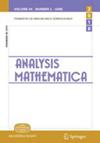具有非卷积Hölder类核的最大截断振荡奇异积分的稀疏界
IF 0.5
3区 数学
Q3 MATHEMATICS
引用次数: 0
摘要
我们研究了由$$T_{P,K}^*f(x)=\sup_{\epsilon>0} \bigg| \int_{|x-y|>\epsilon}e^{iP(x,y)}K(x,y)f(y) \, dy \bigg| ,$$给出的最大振荡奇异积分的稀疏界,其中\(P(x,y)\)是\(\mathbb{R}^n\times \mathbb{R}^n\)上的实值多项式,\(K\)是Calderón-Zygmund非卷积型核。我们证明\(T_{P,K}^*\)满足\(1<r<2\)的\((r,r)\) -稀疏界,这意味着对算子\(T_{P,K}^*\)的加权\(L^p(1<p<\infty)\)估计。本文章由计算机程序翻译,如有差异,请以英文原文为准。
Sparse bounds for maximally truncated oscillatory singular integrals with non-convolutional Hölder class kernels
We investigate the sparse bound for maximal oscillatory singular integrals given by
$$T_{P,K}^*f(x)=\sup_{\epsilon>0} \bigg| \int_{|x-y|>\epsilon}e^{iP(x,y)}K(x,y)f(y) \, dy \bigg| ,$$
where \(P(x,y)\) is a real-valued polynomial on \(\mathbb{R}^n\times \mathbb{R}^n\) and \(K\) is a Calderón–Zygmund non-convolutional type kernel. We show that \(T_{P,K}^*\) satisfies an \((r,r)\)-sparse bound for \(1<r<2\), which implies the weighted \(L^p(1<p<\infty)\) estimate for the operator \(T_{P,K}^*\).
求助全文
通过发布文献求助,成功后即可免费获取论文全文。
去求助
来源期刊

Analysis Mathematica
MATHEMATICS-
CiteScore
1.00
自引率
14.30%
发文量
54
审稿时长
>12 weeks
期刊介绍:
Traditionally the emphasis of Analysis Mathematica is classical analysis, including real functions (MSC 2010: 26xx), measure and integration (28xx), functions of a complex variable (30xx), special functions (33xx), sequences, series, summability (40xx), approximations and expansions (41xx).
The scope also includes potential theory (31xx), several complex variables and analytic spaces (32xx), harmonic analysis on Euclidean spaces (42xx), abstract harmonic analysis (43xx).
The journal willingly considers papers in difference and functional equations (39xx), functional analysis (46xx), operator theory (47xx), analysis on topological groups and metric spaces, matrix analysis, discrete versions of topics in analysis, convex and geometric analysis and the interplay between geometry and analysis.
 求助内容:
求助内容: 应助结果提醒方式:
应助结果提醒方式:


